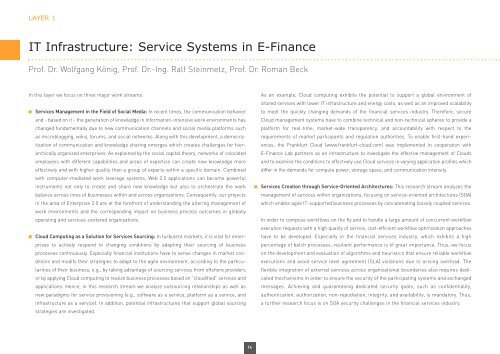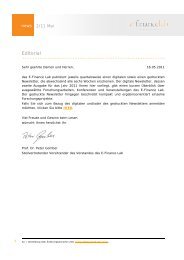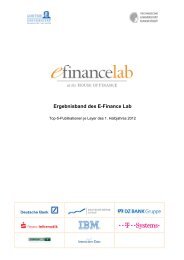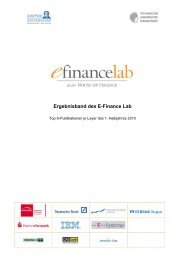The E-Finance Value Chain - E-Finance Lab Frankfurt am Main
The E-Finance Value Chain - E-Finance Lab Frankfurt am Main
The E-Finance Value Chain - E-Finance Lab Frankfurt am Main
You also want an ePaper? Increase the reach of your titles
YUMPU automatically turns print PDFs into web optimized ePapers that Google loves.
LAYER 1<br />
IT Infrastructure: Service Systems in E-<strong>Finance</strong><br />
Prof. Dr. Wolfgang König, Prof. Dr.-Ing. Ralf Steinmetz, Prof. Dr. Roman Beck<br />
In this layer we focus on three major work stre<strong>am</strong>s:<br />
n Services Management in the Field of Social Media: In recent times, the communication behavior<br />
and - based on it - the generation of knowledge in information-intensive work environments has<br />
changed fund<strong>am</strong>entally due to new communication channels and social media platforms such<br />
as microblogging, wikis, forums, and social networks. Along with this development, a democratization<br />
of communication and knowledge sharing emerges which creates challenges for hierarchically<br />
organized enterprises. As explained by the social capital theory, networks of colocated<br />
employees with different capabilities and areas of expertise can create new knowledge more<br />
effectively and with higher quality than a group of experts within a specific domain. Combined<br />
with computer-mediated work leverage systems, Web 2.0 applications can become powerful<br />
instruments not only to create and share new knowledge but also to orchestrate the work<br />
balance across lines of businesses within and across organizations. Consequently, our projects<br />
in the area of Enterprise 2.0 are at the forefront of understanding the altering management of<br />
work environments and the corresponding impact on business process outcomes in globally<br />
operating and services-centered organizations.<br />
n Cloud Computing as a Solution for Services Sourcing: In turbulent markets, it is vital for enterprises<br />
to actively respond to changing conditions by adapting their sourcing of business<br />
processes continuously. Especially financial institutions have to sense changes in market conditions<br />
and modify their strategies to adapt to the agile environment, according to the particularities<br />
of their business, e.g., by taking advantage of sourcing services from offshore providers<br />
or by applying Cloud computing to realize business processes based on “cloudified” services and<br />
applications. Hence, in this research stre<strong>am</strong> we analyze outsourcing relationships as well as<br />
new paradigms for service provisioning (e.g., software as a service, platform as a service, and<br />
infrastructure as a service). In addition, potential infrastructures that support global sourcing<br />
strategies are investigated.<br />
14<br />
As an ex<strong>am</strong>ple, Cloud computing exhibits the potential to support a global environment of<br />
shared services with lower IT infrastructure and energy costs, as well as an improved scalability<br />
to meet the quickly changing demands of the financial services industry. <strong>The</strong>refore, secure<br />
Cloud management systems have to combine technical and non-technical spheres to provide a<br />
platform for real-time, market-wide transparency, and accountability with respect to the<br />
requirements of market participants and regulation authorities. To enable first-hand experiences,<br />
the <strong>Frankfurt</strong> Cloud (www.frankfurt-cloud.com) was implemented in cooperation with<br />
E-<strong>Finance</strong> <strong>Lab</strong> partners as an infrastructure to investigate the effective management of Clouds<br />
and to ex<strong>am</strong>ine the conditions to effectively use Cloud services in varying application profiles which<br />
differ in the demands for compute power, storage space, and communication intensity.<br />
n Services Creation through Service-Oriented Architectures: This research stre<strong>am</strong> analyzes the<br />
management of services within organizations, focusing on service-oriented architectures (SOA)<br />
which enable agile IT-supported business processes by concatenating loosely coupled services.<br />
In order to compose workflows on the fly and to handle a large <strong>am</strong>ount of concurrent workflow<br />
execution requests with a high quality of service, cost-efficient workflow optimization approaches<br />
have to be developed. Especially in the financial services industry, which exhibits a high<br />
percentage of batch processes, resilient performance is of great importance. Thus, we focus<br />
on the development and evaluation of algorithms and heuristics that ensure reliable workflow<br />
executions and avoid service level agreement (SLA) violations due to arising overload. <strong>The</strong><br />
flexible integration of external services across organizational boundaries also requires dedicated<br />
mechanisms in order to ensure the security of the participating systems and exchanged<br />
messages. Achieving and guaranteeing dedicated security goals, such as confidentiality,<br />
authentication, authorization, non-repudiation, integrity, and availability, is mandatory. Thus,<br />
a further research focus is on SOA security challenges in the financial services industry.








